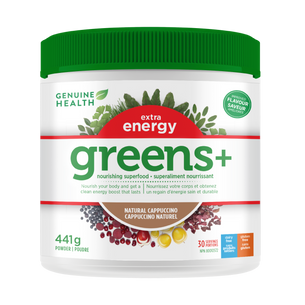L'alimentation d'aujourd'hui et son impact sur la santé

Vous mangez sainement, et pourtant vous vous sentez fatigué. Malgré une consommation importante de fibres et des litres d'eau, vous souffrez toujours de constipation. Et puis, il y a les maladies cardiaques, elles sont héréditaires, et vous n'êtes pas sûr de faire tout votre possible pour les éviter. On vous comprend, ce sont trois des principaux problèmes de santé que nous entendons constamment, et en réalité, ce n'est pas ce que vous faites qui est en cause, mais plutôt ce que subissent les aliments que vous consommez. L'évolution des pratiques agricoles, l'érosion des sols et l'utilisation excessive de pesticides et d'engrais artificiels ont rendu notre alimentation bien moins nutritive qu'elle ne l'était à l'époque de nos grands-parents. Qu'est-ce que cela signifie ? Eh bien, cela signifie que même les régimes les plus sains peuvent souffrir de carences nutritionnelles, ce qui peut impacter tous les processus de notre corps, y compris (et surtout) notre niveau d'énergie, notre digestion et notre santé cardiaque.
C'est pourquoi lorsque Sam Graci a créé Greens+, il a travaillé sans relâche pour étudier chaque ingrédient entrant dans la formule afin de garantir que lorsque vous prenez une mesure de Greens+, vous soutenez chaque aspect de votre santé et comblez les lacunes alimentaires que les aliments modernes pourraient causer.
L'un des principaux ingrédients de greens+ est l'herbe de blé, une céréale issue de la graine de blé et riche en chlorophylle. Ce superaliment puissant a des effets remarquables sur la santé et peut contribuer à améliorer trois des principaux problèmes de santé auxquels notre société est confrontée.
L'herbe de blé est l'une des meilleures sources de chlorophylle, la molécule qui rend les plantes vertes. Sa structure est très similaire à celle de l'hémoglobine (la molécule transportant l'oxygène dans nos globules rouges), à la différence près qu'au lieu d'une molécule de fer en son centre, elle contient une molécule de magnésium. Grâce à cette structure, elle est reconnue pour son action hématogène et contribue à améliorer l'utilisation de l'oxygène par l'organisme. Il a d'ailleurs été rapporté que ceux qui commencent leur journée avec de l'herbe de blé ressentent une amélioration de leur énergie, de leur endurance et de leur résistance.
De plus, l'herbe de blé contribue à purifier le foie et à neutraliser les toxines nocives qui peuvent alourdir notre organisme et nous laisser léthargiques. En stimulant le foie et en favorisant l'élimination des toxines, notre corps est plus efficace, ce qui nous donne plus d'énergie pour accomplir nos tâches.
La santé de notre système digestif est essentielle à notre santé globale, mais comme beaucoup d’entre nous souffrent d’une forme de problème, qu’il s’agisse de brûlures d’estomac, de constipation ou du syndrome du côlon irritable, quelque chose ne fonctionne certainement pas.
Grâce à la richesse en chlorophylle de l'herbe de blé, une seule petite dose contient une quantité exceptionnellement élevée de magnésium. Le magnésium, surnommé « minéral anti-stress naturel », aide à détendre les muscles du squelette et du tube digestif. Cela permet non seulement de maintenir la fonction intestinale ouverte, mais aussi d'y attirer l'eau, favorisant ainsi le transit intestinal et votre santé.
Il a également été démontré que la consommation d'herbe de blé contribue à freiner la prolifération des bactéries nocives dans notre organisme. Une prolifération de « mauvaises » bactéries peut entraîner inflammations, troubles digestifs, allergies et mauvaise digestion. En limitant la prolifération de ces mauvaises bactéries et en favorisant celle des « bonnes » bactéries, nous pouvons améliorer considérablement la santé de notre système digestif.
Les maladies cardiaques sont l’une des principales causes de décès au Canada, mais elles peuvent être fortement liées aux choix alimentaires et au mode de vie.
Le magnésium, notre bon vieux minéral anti-stress, peut aider à détendre les vaisseaux sanguins et à améliorer la pression artérielle, l’une des principales causes de crise cardiaque et d’accident vasculaire cérébral.
Il a également été démontré que l’herbe de blé bloque l’absorption du cholestérol dans l’organisme, favorisant ainsi des niveaux de cholestérol sains et prévenant le développement de l’athérosclérose.
La chlorophylle contient également de la superoxyde dismutase (SOD), une protéine contenant du cuivre et puissante anti-radicalaire présente dans les globules rouges matures. Les dommages causés par les radicaux libres non maîtrisés peuvent contribuer fortement aux maladies cardiaques, car les tissus endommagés peuvent entraîner une inflammation chronique, dont il a été démontré qu'elle augmente le risque de maladie cardiaque, de crise cardiaque et d'accident vasculaire cérébral.
Références
C'est pourquoi lorsque Sam Graci a créé Greens+, il a travaillé sans relâche pour étudier chaque ingrédient entrant dans la formule afin de garantir que lorsque vous prenez une mesure de Greens+, vous soutenez chaque aspect de votre santé et comblez les lacunes alimentaires que les aliments modernes pourraient causer.
L'un des principaux ingrédients de greens+ est l'herbe de blé, une céréale issue de la graine de blé et riche en chlorophylle. Ce superaliment puissant a des effets remarquables sur la santé et peut contribuer à améliorer trois des principaux problèmes de santé auxquels notre société est confrontée.
Énergie
L'herbe de blé est l'une des meilleures sources de chlorophylle, la molécule qui rend les plantes vertes. Sa structure est très similaire à celle de l'hémoglobine (la molécule transportant l'oxygène dans nos globules rouges), à la différence près qu'au lieu d'une molécule de fer en son centre, elle contient une molécule de magnésium. Grâce à cette structure, elle est reconnue pour son action hématogène et contribue à améliorer l'utilisation de l'oxygène par l'organisme. Il a d'ailleurs été rapporté que ceux qui commencent leur journée avec de l'herbe de blé ressentent une amélioration de leur énergie, de leur endurance et de leur résistance.
De plus, l'herbe de blé contribue à purifier le foie et à neutraliser les toxines nocives qui peuvent alourdir notre organisme et nous laisser léthargiques. En stimulant le foie et en favorisant l'élimination des toxines, notre corps est plus efficace, ce qui nous donne plus d'énergie pour accomplir nos tâches.
Digestion/Santé intestinale
La santé de notre système digestif est essentielle à notre santé globale, mais comme beaucoup d’entre nous souffrent d’une forme de problème, qu’il s’agisse de brûlures d’estomac, de constipation ou du syndrome du côlon irritable, quelque chose ne fonctionne certainement pas.
Grâce à la richesse en chlorophylle de l'herbe de blé, une seule petite dose contient une quantité exceptionnellement élevée de magnésium. Le magnésium, surnommé « minéral anti-stress naturel », aide à détendre les muscles du squelette et du tube digestif. Cela permet non seulement de maintenir la fonction intestinale ouverte, mais aussi d'y attirer l'eau, favorisant ainsi le transit intestinal et votre santé.
Il a également été démontré que la consommation d'herbe de blé contribue à freiner la prolifération des bactéries nocives dans notre organisme. Une prolifération de « mauvaises » bactéries peut entraîner inflammations, troubles digestifs, allergies et mauvaise digestion. En limitant la prolifération de ces mauvaises bactéries et en favorisant celle des « bonnes » bactéries, nous pouvons améliorer considérablement la santé de notre système digestif.
Santé cardiaque
Les maladies cardiaques sont l’une des principales causes de décès au Canada, mais elles peuvent être fortement liées aux choix alimentaires et au mode de vie.
Le magnésium, notre bon vieux minéral anti-stress, peut aider à détendre les vaisseaux sanguins et à améliorer la pression artérielle, l’une des principales causes de crise cardiaque et d’accident vasculaire cérébral.
Il a également été démontré que l’herbe de blé bloque l’absorption du cholestérol dans l’organisme, favorisant ainsi des niveaux de cholestérol sains et prévenant le développement de l’athérosclérose.
La chlorophylle contient également de la superoxyde dismutase (SOD), une protéine contenant du cuivre et puissante anti-radicalaire présente dans les globules rouges matures. Les dommages causés par les radicaux libres non maîtrisés peuvent contribuer fortement aux maladies cardiaques, car les tissus endommagés peuvent entraîner une inflammation chronique, dont il a été démontré qu'elle augmente le risque de maladie cardiaque, de crise cardiaque et d'accident vasculaire cérébral.
Références
- 50 raisons de boire de l'herbe de blé tous les jours. The Chalkboard. Consulté en ligne : http://thechalkboardmag.com/50-reasons-to-drink-wheatgrass-everyday
- Herbe de blé. WebMD. Consulté en ligne : http://www.webmd.com/vitamins-supplements/ingredientmono-1073-wheatgrass.aspx?activeingredientid=1073&activeingredientname=wheatgrass
- Les puissants bienfaits de l'herbe de blé pour la santé. Mercola. Consulté en ligne : http://articles.mercola.com/sites/articles/archive/2013/05/20/wheatgrass.aspx
- Bienfaits de l'herbe de blé. Hippocrates Health Institute. Consulté en ligne : http://hippocratesinst.org/living-food/benefits-of-wheatgrass



















































